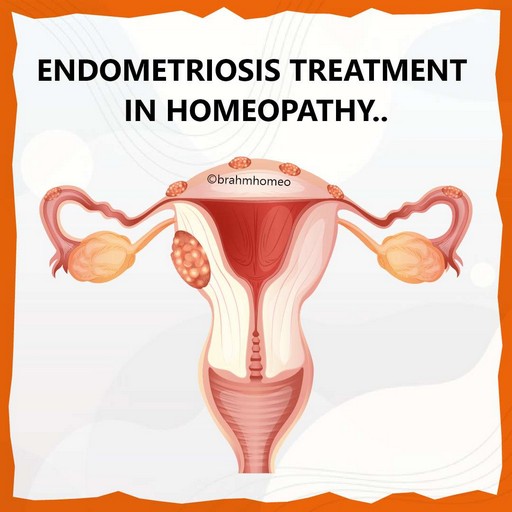
Endometriosis treatment in homeopathy
Endometriosis is the abnormal growth of endometrial tissue similar to that which lines the interior of the uterus, but in a location outside of the uterus. Endometrial tissue is shed each month during menstruation. Areas of endometrial tissue found in ectopic locations are called endometrial implants. These lesions are most commonly found on the ovaries, the Fallopian tubes, the surface of the uterus, the bowel, and on the membrane lining of the pelvic cavity (i.e. the peritoneum). They are less commonly found to involve the vagina, cervix, and bladder. Rarely, endometriosis can occur outside the pelvis. Endometriosis has been reported in the liver, brain, lung, and old surgical scars. Endometrial implants, while they may become problematic, are usually benign (i.e. non-cancerous).

Causes of endometriosis
- The cause of endometriosis is unknown. One theory is that the endometrial tissue is deposited in unusual locations by the retrograde flow of menstrual debris through the Fallopian tubes into the pelvic and abdominal cavities. The cause of this retrograde menstruation is not clearly understood. It is clear that retrograde menstruation is not the only cause of endometriosis, as many women who have retrograde menstruation do not develop the condition.
- Another possibility is that areas lining the pelvic organs possess primitive cells that are able to develop into other forms of tissue, such as endometrium. (This process is termed coelomic metaplasia.)
- It is also likely the direct transfer of endometrial tissues at the time of surgery may be responsible for the endometriosis implants occasionally found in surgical scars (for example, episiotomy or Cesarean section scars).
- Transfer of endometrial cells via the bloodstream or lymphatic system is the most plausible explanation for the rare cases of endometriosis that are found in the brain and other organs remote from the pelvis.
- Finally, there is evidence that some women with endometriosis have an altered immune response in women with endometriosis, which may affect the body's natural ability to recognize ectopic endometrial tissue.

signs and symptoms of endometriosis
Most women who have endometriosis, in fact, do not have symptoms. Of those who do, the most common include:
- Pain (usually pelvic) that usually occurs just before menstruation and lessens after menstruation
- Painful sexual intercourse
- Cramping during intercourse
- Cramping or pain during bowel movements or urination
- Infertility
- Pain with pelvic examinations
The intensity of the pain can vary from month to month, and can vary greatly among affected individuals. Some women experience progressive worsening of symptoms, while others can have resolution of pain without treatment.
Pelvic pain in women with endometriosis depends partly on where endometrial implants of endometriosis are located.
- Deeper implants and implants in areas of high nerve density are more apt to produce pain.
- The implants may also release substances into the bloodstream which are capable of eliciting pain.
- Pain can result when endometriotic implants incite scarring of surrounding tissues. There appears to be no relationship between severity of pain and the amount of anatomical disease which is present.
Endometriosis can be one of the reasons for infertility for otherwise healthy couples. When laparoscopic examinations are performed during evaluations for infertility, implants are often found in individuals who are totally asymptomatic. The reasons diminished fertility in many patients with endometriosis are not understood. Endometriosis may incite scar tissue formation within the pelvis. If the ovaries and Fallopian tubes are involved, the mechanical processes involved in the transfer of fertilized eggs into the tubes may be altered. Alternatively, the endometriotic lesions may produce inflammatory substances which adversely affect ovulation, fertilization, and implantation.
Other symptoms that can be related to endometriosis include
- lower abdominal pain,
- diarrheaand/or constipation,
- low back pain,
- chronic fatigue
- irregular or heavy menstruation,
- painful urination, or bloody urine(particularly during menstruation).
Prognosis
It is curable with homeopathic treatment. Since how long you are suffering from disease, has to do a lot with treatment plan. No matter, since when are you suffering from your disease either from recent time or since many years -everything is curable with us but in early stage of disease, you will be cured faster. For chronic conditions or in later stage or in case of many years of suffering, it will take longer time to be cured. Intelligent person always start treatment as early as observe any sign and symptom of this disease, so immediately contact us as soon as you observe any abnormality in you.
How we work on this disease
Brahm research based, clinically proved, scientific treatment module is very effective in curing this disease. We have a team of well qualified doctors who observe and analysis your case systematically, record all the signs and symptoms along with progress of disease, understand its stages of progression, prognosis and its complications. After that they clear you about your disease in details, provide you proper diet chart [what to eat or what not to eat], exercise plan, life style plan and guide you about many more factors that can improve your general health condition with systematic management of your disease with homeopathic medicines till it get cured.


















